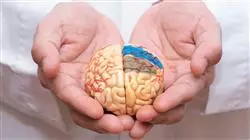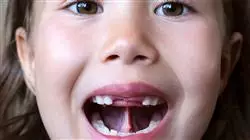University certificate
Scientific endorser

The world's largest faculty of nursing”
Introduction to the Program
This Masters Degree in Speech and Orofacial Neurorehabilitation for Nurses will generate a sense of confidence in the performance of your profession as a nurse, which will help you grow both personally and professionally"

OMT (Orofacial and Myofunctional Therapy) is a discipline that deals with the prevention, assessment, diagnosis and intervention in orofacial alterations or dysfunctions at the anatomical and functional level of the stomatognathic system. This discipline is related to the development of basic functions such as chewing, swallowing, sucking, breathing and simultaneously treating the muscular structures that intervene synergistically in each of these functions.
There is a broad professional demand for training to acquire the necessary competencies to enable the nurse to provide a comprehensive and complete health and clinical response. In this sense, nursing professionals will benefit from this training program, as it integrates the vision of multiple disciplines that converge to offer a better treatment to the patient.
This training in the form of a master in Speech Neurorehabilitation and Analysis of Vital Functions and OMT (Orofacial and Myofunctional Therapy), responds to this demand for continuing education, and is aimed primarily at nursing professionals. With this training course, the nurse will acquire skills to manage speech disorders or disorders of a logopedic nature in different work contexts. In addition, these studies can ease the access to employment in this field, due to the high demand for this type of professionals, both in the health and clinical fields.
This Masters Degree is developed by a specialized work team, formed by several health professionals, creating a multidisciplinary team and integrating the information in a linear and continuous way. At the same time, it offers a very broad vision of orofacial and myofunctional therapy, including examples of successful cases, using all the necessary and basic techniques for the rehabilitation of orofacial alteration, offered and guaranteed by professionals in the field who recognize and certify their application in professional activity.
Through this Masters Degree, you will update your knowledge in Speech Therapy Neurorehabilitation and you will become a first rate nurse"
This Masters Degree in Speech and Orofacial Neurorehabilitation for Nurses contains the most complete and up to date educational program on the market. Development of clinical cases presented by experts in the different areas of multidisciplinary knowledge.
- The development of a large number of case studies presented by experts in speech therapy neurorehabilitation
- The graphic, schematic, and eminently practical contents with which they are created provide scientific and practical information on the disciplines that are essential for professional practice
- New advances in the use of speech-language neurorehabilitation
- Practical exercises where the self-assessment process can be carried out to improve learning
- Algorithm-based interactive learning system for decision-making in the situations that are presented to the student
- Special emphasis on evidence-based methodologies in speech-language neurorehabilitation
- Theoretical lessons, questions to the Postgraduate Diploma, debate forums on controversial topics, and individual reflection assignments
- Content that is accessible from any fixed or portable device with an Internet connection
This Masters Degree may be the best investment you can make in the selection of a refresher program for two reasons: in addition to updating your knowledge in speech-language neurorehabilitation for nurses, you will obtain a Masters Degree from TECH Global University"
It includes in its teaching staff professionals belonging to the field of speech therapy neurorehabilitation who bring to this training the experience of their work, as well as recognized specialists belonging to reference societies and prestigious universities.
The multimedia content developed with the latest educational technology will provide the professional with situated and contextual learning, i.e., a simulated environment that will provide an immersive training program to train in real situations.
The design of this program is based on problem-based learning, by means of which the professional must try to solve the different professional practice situations that arise throughout the course. For this purpose, the professional will be assisted by an innovative interactive video system developed by recognized experts in the field of speech therapy neurorehabilitation with extensive teaching experience.
Make the most of the opportunity to learn about the latest advances in speech-language neurorehabilitation and improve your skills as a nurse"

This program will allow you to increase your confidence in decision making, as it will update your knowledge and turn you into a first rate nurse"
Why study at TECH?
TECH is the world’s largest online university. With an impressive catalog of more than 14,000 university programs available in 11 languages, it is positioned as a leader in employability, with a 99% job placement rate. In addition, it relies on an enormous faculty of more than 6,000 professors of the highest international renown.

Study at the world's largest online university and guarantee your professional success. The future starts at TECH”
The world’s best online university according to FORBES
The prestigious Forbes magazine, specialized in business and finance, has highlighted TECH as “the world's best online university” This is what they have recently stated in an article in their digital edition in which they echo the success story of this institution, “thanks to the academic offer it provides, the selection of its teaching staff, and an innovative learning method aimed at educating the professionals of the future”
A revolutionary study method, a cutting-edge faculty and a practical focus: the key to TECH's success.
The most complete study plans on the university scene
TECH offers the most complete study plans on the university scene, with syllabuses that cover fundamental concepts and, at the same time, the main scientific advances in their specific scientific areas. In addition, these programs are continuously being updated to guarantee students the academic vanguard and the most in-demand professional skills. In this way, the university's qualifications provide its graduates with a significant advantage to propel their careers to success.
TECH offers the most comprehensive and intensive study plans on the current university scene.
A world-class teaching staff
TECH's teaching staff is made up of more than 6,000 professors with the highest international recognition. Professors, researchers and top executives of multinational companies, including Isaiah Covington, performance coach of the Boston Celtics; Magda Romanska, principal investigator at Harvard MetaLAB; Ignacio Wistumba, chairman of the department of translational molecular pathology at MD Anderson Cancer Center; and D.W. Pine, creative director of TIME magazine, among others.
Internationally renowned experts, specialized in different branches of Health, Technology, Communication and Business, form part of the TECH faculty.
A unique learning method
TECH is the first university to use Relearning in all its programs. It is the best online learning methodology, accredited with international teaching quality certifications, provided by prestigious educational agencies. In addition, this disruptive educational model is complemented with the “Case Method”, thereby setting up a unique online teaching strategy. Innovative teaching resources are also implemented, including detailed videos, infographics and interactive summaries.
TECH combines Relearning and the Case Method in all its university programs to guarantee excellent theoretical and practical learning, studying whenever and wherever you want.
The world's largest online university
TECH is the world’s largest online university. We are the largest educational institution, with the best and widest online educational catalog, one hundred percent online and covering the vast majority of areas of knowledge. We offer a large selection of our own degrees and accredited online undergraduate and postgraduate degrees. In total, more than 14,000 university degrees, in eleven different languages, make us the largest educational largest in the world.
TECH has the world's most extensive catalog of academic and official programs, available in more than 11 languages.
Google Premier Partner
The American technology giant has awarded TECH the Google Google Premier Partner badge. This award, which is only available to 3% of the world's companies, highlights the efficient, flexible and tailored experience that this university provides to students. The recognition as a Google Premier Partner not only accredits the maximum rigor, performance and investment in TECH's digital infrastructures, but also places this university as one of the world's leading technology companies.
Google has positioned TECH in the top 3% of the world's most important technology companies by awarding it its Google Premier Partner badge.
The official online university of the NBA
TECH is the official online university of the NBA. Thanks to our agreement with the biggest league in basketball, we offer our students exclusive university programs, as well as a wide variety of educational resources focused on the business of the league and other areas of the sports industry. Each program is made up of a uniquely designed syllabus and features exceptional guest hosts: professionals with a distinguished sports background who will offer their expertise on the most relevant topics.
TECH has been selected by the NBA, the world's top basketball league, as its official online university.
The top-rated university by its students
Students have positioned TECH as the world's top-rated university on the main review websites, with a highest rating of 4.9 out of 5, obtained from more than 1,000 reviews. These results consolidate TECH as the benchmark university institution at an international level, reflecting the excellence and positive impact of its educational model.” reflecting the excellence and positive impact of its educational model.”
TECH is the world’s top-rated university by its students.
Leaders in employability
TECH has managed to become the leading university in employability. 99% of its students obtain jobs in the academic field they have studied, within one year of completing any of the university's programs. A similar number achieve immediate career enhancement. All this thanks to a study methodology that bases its effectiveness on the acquisition of practical skills, which are absolutely necessary for professional development.
99% of TECH graduates find a job within a year of completing their studies.
Master's Degree in Logopedic and Orofacial Neurorehabilitation for Nursing
Abnormalities that affect vital functions such as feeding and impede human communication require careful primary and specialized attention. To this end, TECH Global University has created a Master's Degree focused on the analysis and assessment of the different structural alterations of this system. Throughout the program, anatomical knowledge of the brain and nervous system will be reviewed in order to subsequently dive into the effects of pathologies on cognitive functions and the process of degeneration. Once these bases are mastered, the set of techniques of speech therapy intervention will be addressed, such as neuropsychological rehabilitation, behavioral and occupational therapy, as well as treatments for oropharyngeal and esophageal dysphagia: orofacial myofunctional therapy, bolus propulsion exercises, electrotherapy in swallowing, among others. In addition, the participation of speech therapy in procedures related to occlusion and malocclusion will be deepened. In this way, students will develop the necessary skills to assist in the reeducation of neuromuscular functions and improve the patient's quality of life.
Postgraduate in Logopedic and Orofacial Neurorehabilitation for Nursing
Taking this TECH Postgraduate Certificate is an excellent opportunity to train in the execution of procedures aimed at the normalization of altered functions that hinder gesticulation, sucking, swallowing, chewing and breathing. In order to guarantee the effectiveness of such treatments, specialized contents are offered in rehabilitation or, in case this is not possible, in the implementation of replacement mechanisms. Likewise, interpretative tools are provided for the evaluation of the Main Vital Functions (MVF), in order to elaborate, consequently, a series of strategies to facilitate feeding and motor activity. At the end of the program, the future expert in this field will create programs for the prevention of myofunctional and orofacial disorders, paying special attention to the exploration, evaluation, diagnosis and prognosis of the evolution of the alterations in each of the cases in which he/she is involved. This background will allow him/her to perform in an outstanding manner in daily clinical and health practice, while contributing to the improvement of the quality of medical care provided to these patients.







